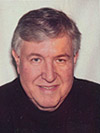| Home | Blog | Ask This | Showcase | Commentary | Comments | About Us | Contributors | Contact Us |

Should the press interview grand jurors? Why not?SHOWCASE | May 124, 2012Barry Sussman describes how it was that the Washington Post’s Watergate reporters came to call on grand jurors, and says that, as an editor, if a similar situation arose he would make the same assignment again. By Barry Sussman I personally have known about this for a long time, as I’m the editor who gave them the assignment. Until now the reporters have admitted trying to interview grand jurors but said they never got information from any of them. Now the two are saying they disguised the source’s identity in their book, All the President’s Men, to protect her – and that it was only after Bernstein had begun interviewing her that he found out she was a grand juror. I was the Watergate editor at the Washington Post. I thought it was proper to interview grand jurors then. It wasn't an easy call but I would do it again in a similar situation – that is, if the issues, as in Watergate, involved what appeared to be a cover-up by powerful people on issues of major importance. One thing worth noting: It’s not as though we were creative enough on our own to envision grand jurors as a source. Highfalutin principles aside, it was really by accident that we got the idea. Here’s what happened, as I remember it. One day in the fall of 1972 a colleague mentioned that a grand juror was dissatisfied with deliberations and wanted to talk to the press. I then asked a lawyer (not our usual lawyers but one from Newsweek) if he would research a question for me. Not give me his opinion, but research the question. I told him I wanted to know if we could interview Watergate grand jurors. "No, you can't; it's out of the question," was his immediate response. But he got back to me a day or two later and said, “This is a gray area. It seems reporters can contact grand jurors and ask them anything they want but the grand jurors can't violate their oath to not reveal deliberations." I felt that was all we needed. It was clear from our reporting, and that of other news organizations, that the Watergate conspiracy was ongoing and that we were duty bound to track it however we could, as long as what we did was legal. Where to get a better handle on a possible cover-up than through a grand jury before which the Watergate conspirators were testifying? So one or both of the reporters almost immediately called on the dissatisfied grand juror. But lo and behold, that person was on a different panel, not the Watergate grand jury at all. It was at that point that Woodward went to a DC court building and found and recorded the names and addresses of all the Watergate grand jurors. I sent the full list to Kirk Scharfenberg, our city hall reporter, to check voter registration for each person, with the idea that if there were any registered Republicans on the list, we might want to avoid them. Then for one or two evenings, as I remember it, the reporters knocked on doors. The woman in the Bernstein memo was the only one who had anything to say. She congratulated him for the work the Post had done, and reeled off a bunch of names we might want to look into. The names, often, were of those taking part in the cover-up. Haldeman, John Dean, John Ehrlichman, Colson, John Mitchell and others. Our attempts at grand jury interviews were short-lived. During deliberations, one juror announced that a reporter had come calling, and then a second person said the same thing, and then a third. Each said they hadn’t given out any information. As an editor and a citizen I’m not sure what the stink is over grand jury deliberations, why they are considered inviolable, sacrosanct. For one thing, it’s hardly unheard of (though not so much in the Watergate case), for prosecutors to feed grand jury information to the press when it serves their purposes; thus deliberations aren’t inviolable after all. For another, there is the very serious matter of the public’s right to know. One illustration, for example, since Watergate: I believe the country would be better off if we knew the details of Patrick Fitzgerald’s Valerie Plame inquiry of a few years ago, the one with the prosecutor's “cloud over Cheney” assertion. Obviously a great deal of information was gathered on high-level misconduct – and the result was almost a total fizzle when it came to dealing with wrongdoing in high places. Our attempt to interview grand jurors won praise from a very high, esteemed legal source. The late Howard Simons, then managing editor of the Post, was at a conference where he met Supreme Court Associate Justice Potter Stewart. Simons told me that he asked Stewart his views on our attempts to interview grand jurors. Stewart told him, Simons said, that given what the Post knew about the Watergate scandal at that point, it would have been derelict of us not to try.
|
|||||||||||||||



